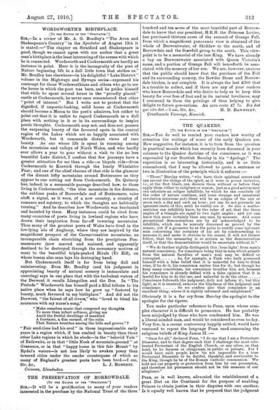WORDSWORTH'S BIRTHPLACE.
[To THE EDITOR OF THE "SPECTATOR."]
a review of Mr. A. G. Bradley's "The Avon and Shakespeare's Country" in the Spectator of August 13th it
is stated :—" The chapter on Stratford and Shakespeare is good, though we cannot agree with our author that a great man's birthplace Cs the least interesting of the scenes with which he is connected. Wordsworth and Cockermouth are hardly an instance in point. Here it is the incongruity of the poet of Nature beginning life in a dull little town that strikes us." Mr. Bradley has elsewhere—in his delightful "Lake District" volume in the Highways and Byways series—expressed his contempt for those Wordsworthians and others who go to see the house in which the poet was born, and he prides himself that while he spent several hours in the "proudly placed" castle at Cockermouth, he never once remembered that other "point of interest." But I write not to protest that the dignified, if unpoetic-looking, solid house at Cockermouth should become a Mecca to the poet's admirers, but rather to point out that it is unfair to regard Coekermouth as a dull place with nothing in it or in its surroundings to inspire poetic thoughts. Cockermouth may not, and does not, possess the surpassing beauty of the favoured spots in the central region of the Lakes which are so happily associated with Wordsworth, but it commands distant views of rare beauty. As one whose life is spent in roaming among the mountains and valleys of North Wales, and who hardly ever allows a year to pass without a visit to the no less beautiful Lake district, I confess that few journeys have a greater attraction for me than a ride—a bicycle ride—from Cockermouth to Keswick through the lonely Whinlatter Pass ; and one of the chief charms of that ride is the glamour of the distant lofty mountains around Buttermere as they appear to one setting out from Cockermouth. De Quincey has, indeed, in a memorable passage described how, to those living in Cockermouth, "the blue mountains in the distance, the sublime peaks of Borrowdale and of Buttermere, raise aloft a signal, as it were, of a new country, a country of romance and mystery, to which the thoughts are habitually turning." And he describes bow Wordsworth was fascinated and haunted by them. Many instances could be cited from many countries of poets living in lowland regions who have drawn their inspiration from far-off towering mountains Thus many of the greatest poets of Wales have lived in the low-lying isle of Anglesey, where they are inspired by the magnificent prospect of the Carnarvonshire mountains, an incomparable chain stretching from the precipitous Pen- maenmawr (now marred and maimed, and apparently destined to be destroyed through the mercenary motives of man) to the beautiful triple-peaked Rivals (Yr Bill), on whose bosom also man lays his destroying hand.
But Cockermouth itself is far from being dull and uninteresting. Even Mr. Bradley (and his judgment in appreciating beauty of natural scenery is immaculate and unerring) says in one place that with the turbulent waters of the Derwent it recalls Llangollen and the Dee. In "The Prelude" Wordsworth has himself paid a filial tribute to his native place when he says how he grew up "fostered by beauty, much favoured in my birthplace." And did not the Dement, "the fairest of all rivers," who "loved to blend his murmurs with my nurse's song,".
"Make ceaseless music that composed my thoughts
To more than infant softness, giving me Amid the fretful dwellings of mankind A foretaste, a dim earnest, of the calm
That Nature breathes among the hill.' and groves"
"Fair seed-time had his soul" in these impressionable early years in a region which, if less exalted in beauty than those other Lake regions in which he abode—in the "beloved Vale" of Esthwaite, or in that "little Nook of mountain-ground " at Grasmere, or in that "happy home in this fair Mount" by Rydars waters—is not less likely to awaken poesy than towered cities under the smoke counterpane of which so many of England's greatest poets have been bred.—I am, Ceinvan, Llandudno.
L. J. ROBERTS.






































 Previous page
Previous page